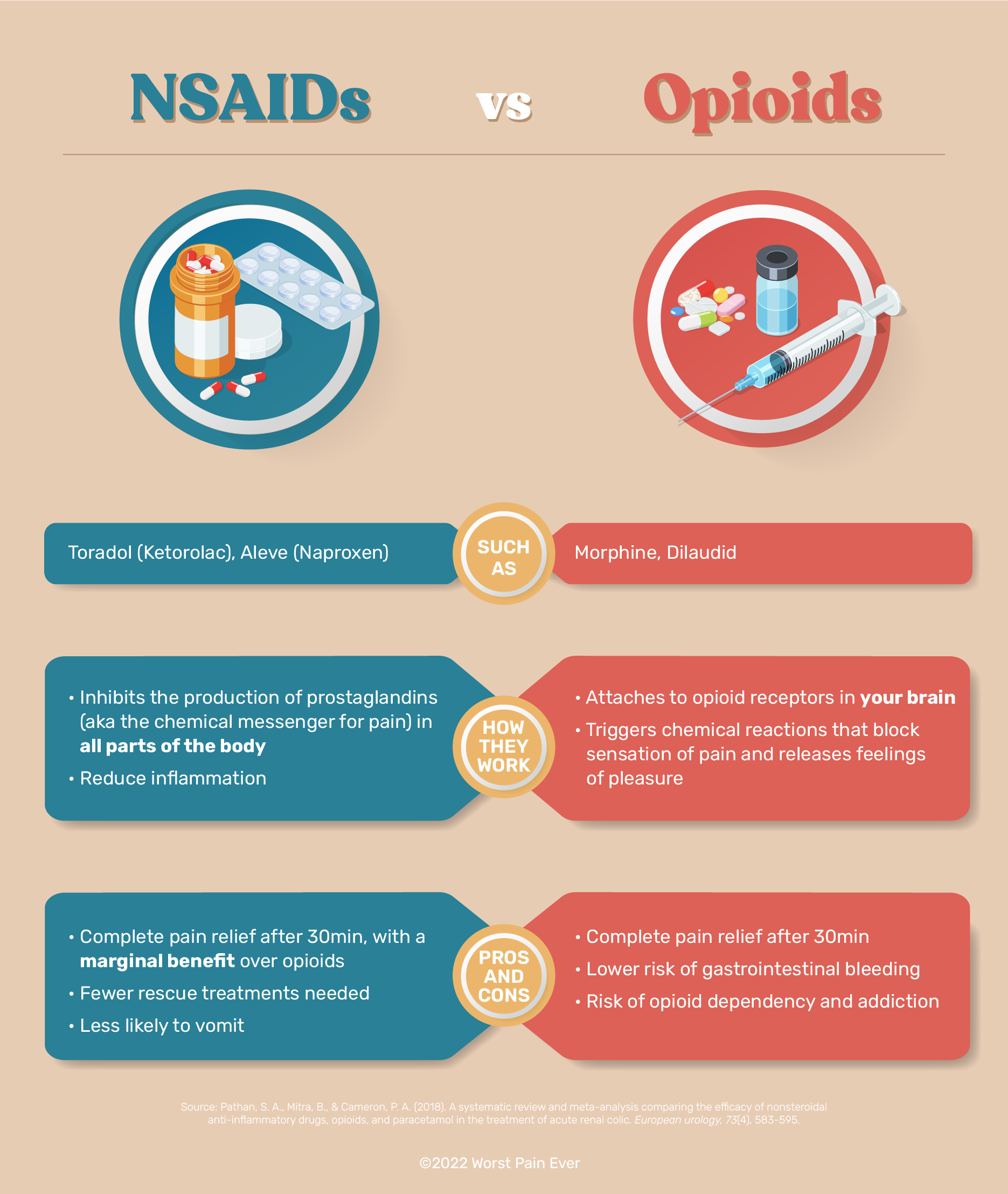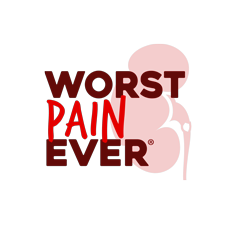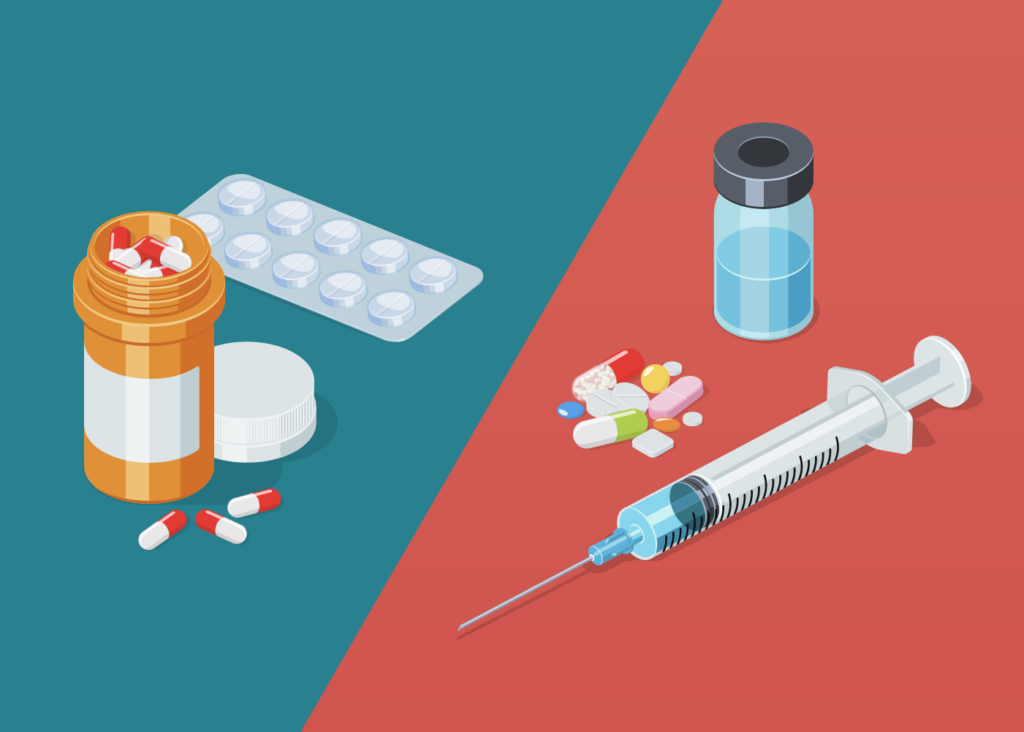Opioids or NSAIDs, that is the question. Everybody has different levels of pain tolerance, and it is important that you get the pain relief for kidney stones that works for you! Read on to find out more about how opioids and NSAIDs work – and get an answer to that perennial question on which is the more effective pain relief option for kidney stones?
What are opioids?
Opioids are drugs naturally found in the opium poppy plant and its pain-relieving effects are used for acutely painful medical and surgical conditions1. Some commonly used opioids such as Morphine and Dilaudid are often sold under brand names, such as Percocet and OxyContin2.
How do opioids work?
When kidney stones aggravate your urinary tract, pain receptors are activated and will send a signal to your brain. Opioids work by attaching to receptors in your brain, spinal cord and other parts of the body. Once that happens, they block any pain messages sent from your body through the spinal cord to your brain. That means that you won’t be able to feel pain after 30 minutes3!
If you’ve had a kidney stone before, your urologist may have prescribed opioids to relieve severe pain caused by your kidney stones, or pain after a stone treatment (e.g. URS or PCNL).
What are nonsteroidal anti-inflammatory drugs (NSAID)s?
NSAIDs are commonly used to reduce inflammation, relieve kidney stone pain, and/or lower fevers. Some frequently prescribed NSAIDs include Aleve (Naproxen) and Toradol (Ketorolac).
How do NSAIDs work?
When your kidney stones irritate your urinary tract, an enzyme known as prostaglandin is released. Prostaglandin causes inflammation, which is where NSAIDs come in handy! They inhibit the production of prostaglandin, reducing your pain4.
Numerous studies have found that NSAIDS can reduce pain for acute renal colic (pain specifically caused by kidney stones)5. When taken, NSAIDs can relieve your pain completely after 30 minutes6.
I’m in a lot of pain. Why is my doctor reluctant to prescribe opioids to me?
Presently, millions of American citizens face opioid use disorder, with 450,000 opioid-related deaths from 1999 to 20187. If you frequently take opioids to ease the pain, your body may get used to the prescribed dosage and you may need more to relieve the pain. Unfortunately, opioid dependency may lead to addiction4 and result in death due to an overdosage.
In addition, opioids come with many unwanted side effects such as nausea and dizziness8, or even life-threatening complications when prescribed after surgery6. Given the negative side effects of opioids and the ongoing opioid epidemic, doctors are looking into alternatives while ensuring that the pain you experience is adequately treated9.
Are NSAIDs less effective than opioids?
In most cases, no!
According to the American Urological Association, NSAIDs can be just as effective as opioids in relieving your kidney stone pain10. Additionally, NSAIDs reduced the likelihood of vomiting6 and required fewer rescue treatments (which happens when you experience breakthrough pain). Although NSAIDs have a higher risk of causing gastrointestinal bleeding in comparison to opioids, the side effects of NSAIDs are dose and time-dependent, only occurring if they are used long term11.
I know my body best, and opioids are the only thing that works for me. What should I do?
Be careful of how much opioids you ingest as they can cause irreversible damage to your body! You should speak to your urologist about the pain you’re experiencing and be open to other alternatives to opioids. Your urologist may recommend other types of pain relievers such as NSAIDs, which may be the best pain relief for your kidney stones. Ultimately, we – and your urologist – care about your health, which is why we want you to be careful about your opioid intake!
In summary
Kidney stone pain can be an absolute horror to deal with, but opioids are not the only effective pain relief method out there. Many other kidney stone patients have found NSAIDs to be equally helpful, and its benefits have been widely documented. Keep an open mind, as you explore your pain relief options with your urologist!

Sources:
Cragg, A., Hau, J. P., Woo, S. A., Kitchen, S. A., Liu, C., Doyle-Waters, M. M., & Hohl, C. M. (2019). Risk factors for misuse of prescribed opioids: a systematic review and meta-analysis. Annals of emergency medicine, 74(5), 634-646.
Kuo, A., Wyse, B. D., Meutermans, W., & Smith, M. T. (2015). In vivo profiling of seven common opioids for antinociception, constipation and respiratory depression: no two opioids have the same profile. British journal of pharmacology, 172(2), 532-548.
Machelska, H., & Celik, M. Ö. (2020). Opioid receptors in immune and glial cells—implications for pain control. Frontiers in immunology, 11, 300.
- Davenport, K., & Waine, E. (2010). The role of non-steroidal anti-inflammatory drugs in renal colic. Pharmaceuticals, 3(5), 1304-1310.
Robles, J., Abraham, N. E., & Brummett, C. (2021). Rationale and Strategies for Reducing Urologic Post-Operative Opioid Prescribing [White paper]. American Urological Association.
- Afshar, K., Jafari, S., Marks, A. J., Eftekhari, A., & MacNeily, A. E. (2015). Nonsteroidal anti‐inflammatory drugs (NSAIDs) and non‐opioids for acute renal colic. Cochrane database of systematic reviews, (6).
- Kottooran, C., Sternberg, K., Stern, K. L., Pais Jr, V. M., & Eisner, B. H. (2021, January). Opioids and Kidney Stones. In Seminars in Nephrology (Vol. 41, No. 1, pp. 19-23). WB Saunders.
- Furlan, A. D., Sandoval, J. A., Mailis-Gagnon, A., & Tunks, E. (2006). Opioids for chronic noncancer pain: a meta-analysis of effectiveness and side effects. Cmaj, 174(11), 1589-1594.
Brady, K. T., McCauley, J. L., & Back, S. E. (2016). Prescription opioid misuse, abuse, and treatment in the United States: an update. American Journal of Psychiatry, 173(1), 18-26.
- Fedrigon, D., Faris, A., Kachroo, N., Jain, R., Elia, M., Wilkins, L., … & Sivalingam, S. (2021). SKOPE—Study of Ketorolac vs Opioid for Pain after Endoscopy: a double-blinded randomized control trial in patients undergoing ureteroscopy. The Journal of urology, 206(2), 373-381.
- Aua 2022: Nsaids noninferior to opioids in pain management after surgery for nephrolithiasis. PracticeUpdate. (2022, May 25). Retrieved September 19, 2022, from https://www.practiceupdate.com/content/aua-2022-nsaids-noninferior-to-opioids-in-pain-management-after-surgery-for-nephrolithiasis/136445





